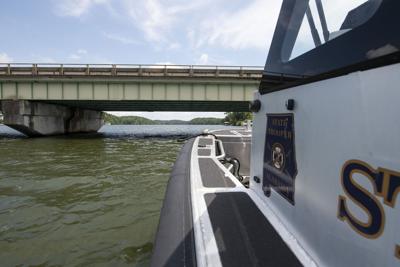A couple of boating regulation changes are coming to Lake Martin starting in October.
Two laws have been enacted this session that will impact Lake Martin. The first one was bill HB209, also called the proximity law.
Part of the law applies to wakeboarding and wakesurfing which can’t be done between sunset and sunrise, on any portion of impounded waters where the width is less than 400 feet, within 200 feet of any shoreline, dock or other structure on the water. Plus, an individual must wear a personal flotation device approved by the United States Coast Guard.
The other portion is the proximity law, which states vessels may not operate above idle speed within 100 feet from any shoreline, dock or other structures on the water. Marine patrol chief Matt Brooks said the division has been asking for this proximity law since 2009 as it connects to quality of life along the lake.
Once the law is effective Oct. 1, the division will issue a warning for a first offense. After that there will be a fine.
Another bill, HB375, on out of state boat operators was also recently enacted. This requires a boater safety certification for Alabama nonresidents. If the individual already has a boater safety certification from another state, then they are exempt. Otherwise, the individual is required to obtain Alabama nonresident boater safety certification effective Oct. 1.
Brooks said since 2019 there have been 43 reported boating accidents on Lake Martin. A quarter of the 43 accidents involved out of state operators.
“What we are seeing in boating accidents is the same thing — the same top three causes,” he said. “It’s operator inattention, operator inexperience and alcohol.”
Brooks said the hope is for some of these recent legislative changes to help alleviate accidents. To give more context to the boat accidents, seven of the 43 accidents resulted in fatalities. A little over half of those seven fatalities came down to individuals not wearing a proper personal flotation device.
Also out of those 43 accidents, there were 20 reported injuries, meaning the individual had to be rushed to the hospital, and in those 43 accidents there has been $260,000 worth of property damage.
When boating accidents happen, Brooks said there’s a lot of social media attention, which has positives and negatives. It helps people stay informed but can also spread misinformation, especially when it comes to false report instances. Regardless, their job is to respond to calls.
“We sometimes get called the fun police because you are out there having a lot of fun on the water and we come along to ruin the fun,” he said. “But we are a necessary part (of the lake). We got a specific role to play out there to prevent these accidents from happening.”
When the marine patrol division was initially forming, the federal government required the division to fill roles in order to gain federal funding. This includes having a law enforcement presence, a valid vessel identification and registration system, an adequate education program for recreational boaters, aids to navigation and maintaining the integrity of the hull number identification system.
This still applies today, and the federal funds make up 20% of the division’s budget. Brooks said their job is twofold: providing law enforcement and educating people on boater safety.
Some of the other recent changes to boating were in 2023 when Alabama reclassified violations on the water from a misdemeanor to a boating violation. This impacted the fines and court cost by capping the fine at $200 and a violation won’t appear on a criminal record.
Alabama has also started a titling system for vessels. If you purchased a boat after Jan 2024, it is required to be titled unless the boat is less than 18 feet long and less than 75 horsepower. Brooks said going forward this is to help track the owners of abandoned boats or stolen boats, which can be falsely registered.
Brooks was the guest speaker at the Lake Martin Dadeville Area Kiwanis Club meeting on May 9.


